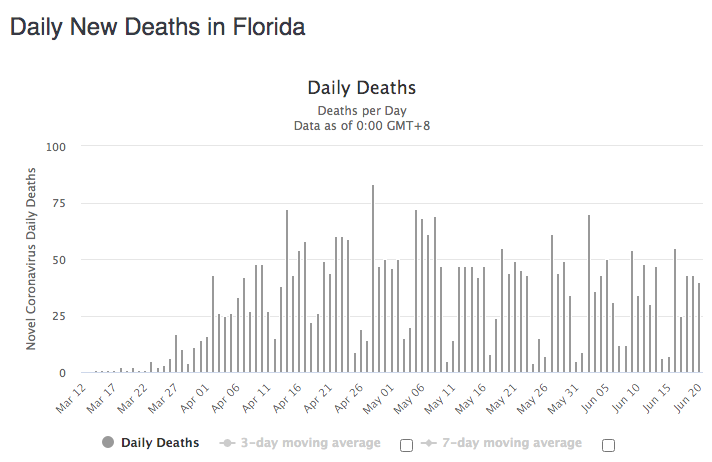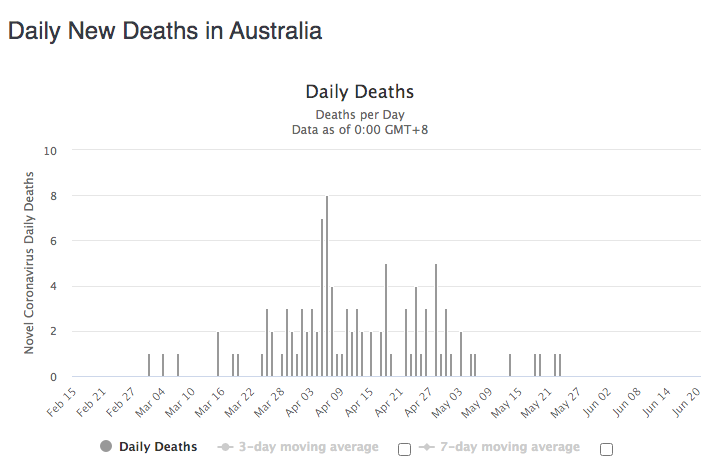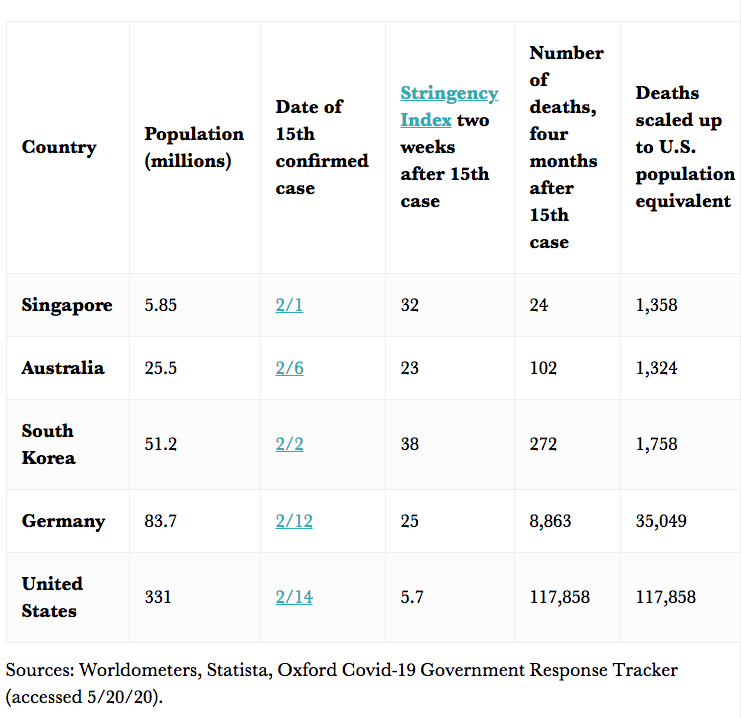
A few months back, I pointed out that Australia was handling the Covid-19 epidemic far better than the US or Canada. At the time, several people told me that this was because it was summer in Australia and winter in the Northern Hemisphere.
Now it’s June, so it’s worth taking another look at the relative performance of Australia and the US. Let’s consider Florida, a very warm state with a slightly lower population than Australia. During June, Florida has been averaging roughly 35 Covid-19 deaths per day:

How about Australia? It turned out that during June (a winter month in Australia), the death rate has averaged zero. Indeed there hasn’t been a single Covid-19 death in four weeks:

So much for the theory that Australia was doing better due to warm weather.
A new study suggests that between 70% and 99% of America’s 120,000 Covid-19 deaths could have been prevented with more sensible policies. This table shows the death rate in various countries, scaled up to the US population:

I wouldn’t put too much weight on these specific estimates, but it’s becoming increasingly difficult to argue that the US (and European) response to Covid-19 was sensible. The fact that Australia continues to average zero deaths even during their winter is a sign that the warm weather excuse doesn’t hold up. Something went very, very wrong in the US.
We had plenty of warning in January and February to prepare for the epidemic, and did almost nothing. Yes, it’s possible that none of this matters. Maybe thousands more Australians will die from Covid-19 before a vaccine is developed. But I wouldn’t necessarily count on that happening.

READER COMMENTS
John Hall
Jun 21 2020 at 2:17pm
The table shows the stringency index two weeks after the 15th case, but what about the value currently? Much higher. The problem was we didn’t get it under control quickly.
Scott Sumner
Jun 21 2020 at 2:28pm
Exactly.
DeservingPorcupine
Jun 21 2020 at 2:29pm
There are always only two questions that matter when understanding the virus in a country.
1. Did the virus ever actually get a foothold there?
2. How are the elderly situated/protected?
Oleg
Jun 22 2020 at 9:52am
On Australia’s and Canada’s coronavirus approaches/outcomes for nursing homes. Ironically, polar opposites:
https://www.cbc.ca/news/world/australia-covid-19-long-term-care-1.5591912
Alan Goldhammer
Jun 21 2020 at 3:05pm
Australia has had a hard travel ban since mid-March. Only returning citizens have been able to return. They also do not have as dense housing units as some areas of the US. I suspect they are also fitter with fewer co-morbidities than those who are at risk here in the US.
The virus continues to remain present in Australia but at low levels.
Market Fiscalist
Jun 21 2020 at 4:16pm
What specifically has Australia done that has kept its number of cases and deaths so low ? I am not aware of anything that was done that was wildly different in degree or timing from what was done in the US and yet the numbers differ wildly. Perhaps it was the fact that it was summer in Australia when the initial wave of infectious hit, or some other reason, but I am not really buying that is down to bad US policy v good policy in Australia.
There are many US states that are doing better than Germany and the some of the “good” countries that Scott lists. Would he applaud them for practicing good policy too?
Mark
Jun 21 2020 at 4:40pm
Yes, the US outbreak is very regional now: much of the Northeast and Midwest are on the European trajectory, while cases are rising more rapidly in the South and West. I think culture probably matters more than policy; policy wasn’t really that different across US states. But there did seem to be differences in denialism and reflexive anti-mask wearing… I wonder if other countries had that too.
robc
Jun 23 2020 at 9:04am
I only look at deaths, not cases*, but south and west look like same trajectory as US and Europe, although much slower decline in west.
Part of the reason both have a slower decline (especially the west) is the peak wasn’t very high.
*As bad as death data is (too many deaths with covid, as opposed to deaths from covid, being counted, but at least it is consistent), I don’t trust trend data on cases at all, way too many ways it is wrong.
robc
Jun 23 2020 at 9:18am
Despite whatever issues the west is having, it still has the lowest death rate of any region.
Northeas’s curve looks good only because their peak was so gawdawful.
Scott Sumner
Jun 21 2020 at 7:14pm
Germany is far more densely populated than the successful US states that you mention.
Australia is doing far better than even the best US states, despite having several large metro areas. Even small rural states have many more fatalities in the past month than Australia. The key is that Australia addressed the problem early, whereas the US waited until it was out of control.
Rob Read
Jun 22 2020 at 12:01am
Can you clarify ‘The key is that Australia addressed the problem early, whereas the US waited until it was out of control.’ ? What specifically did Australia do ?
At the moment the US looks like it will be end up with deaths per million somewhere in the mid range for countries of similar wealth. There are clearly lots of other factors involved, but you just seem to use these other factor selectively (as here, where you claim that for US States that are doing better – its just down to population density) . I’m not getting what is driving your ‘America has done really badly’ rhetoric. Is it just Anti-Trump-ism ? If its something else I think you need to state your case more clearly.
Scott Sumner
Jun 22 2020 at 1:46pm
We waited too long to begin social distancing. We botched our testing regime to a degree that is almost unimaginable. We actively discouraged the use of face masks.
And controlling for density we are not typical of a developed country, we are worse than average.
You ask:
“I’m not getting what is driving your ‘America has done really badly’ rhetoric.”
Isn’t tens of thousands of unnecessary deaths enough to drive “outrage”? I’ve also been outraged about our kidney transplant laws, and our drug laws.
As far as “anti-Trumpism” I’ve never argued that Trump is primarily to blame for our poor response.
Mark Bahner
Jun 22 2020 at 3:26pm
How long did Japan wait for social distancing? Didn’t Japan test even less than we have?
So isn’t the huge variable the use of masks?
Japan “struggles to get a grip on social distancing” (but is great with masks)
robc
Jun 23 2020 at 9:08am
I think masks may be the only valid point in that.
Some people started social distancing early, so if others didnt (myself included) that is on them. My mom went into isolation in mid-Feb. I thought she was being paranoid. She was, but she was also right. Anyone who didn’t do like she did has only themselves to blame, if the information was out there for my mom to figure it out, no one else has an excuse.
Mark
Jun 21 2020 at 4:37pm
The really shocking comparison I saw recently was the US versus the European Union, both large, democratic, decentralized, and open territories. New cases in Europe have fallen dramatically, while in the US there is a plateau. https://sanjuanislander.com/news-articles/31295/a-sobering-chart-eu-vs-usa-statistics-of-confirmed-covid-cases
I get there’s lots of reasons why the US might not have been able to pull off the response of an Asian country, but what’s the excuse compared to Europe?
Scott Sumner
Jun 21 2020 at 7:14pm
Good point.
robc
Jun 23 2020 at 9:12am
What plateau?
https://imgur.com/a/DTKdtZl
I know, this is deaths (smoothed, 7 day average), not cases. But it is the important stat. I really don’t care about cases, I figure as many asymptomatic cases as possible is a good thing.
Chase
Jun 21 2020 at 6:30pm
I think the seasonal aspect isn’t hot vs cold but rather indoor vs outdoor. Most of the states blowing up right now go inside for the summer. They congregate indoors with crowds as opposed to outdoors. I don’t know how Australians behave in their summer but I wonder if a better compare is my state of Colorado.
Scott Sumner
Jun 21 2020 at 7:16pm
Perhaps, but Australia is also doing far better than Colorado.
And Australia’s summers are just as hot as Florida’s summers.
Chase
Jun 22 2020 at 12:12am
I definitely don’t think that’s the case. Average high temp in the two largest cities of Melbourne and Sydney are 12 degrees cooler in their summers than Jacksonville for instance. It took Australia two months to get from peak daily deaths around Apr 9 to basically none after May. It has taken Colorado two months to get from peak daily deaths on Apr 23 to almost none now. Colorado was higher peak. No doubt Australia reacted quicker and better, but I think the weather impact is greater than your indicating on the maintenance of that progress.
Rajat
Jun 22 2020 at 2:15am
It’s true Melbourne and Sydney are much cooler than Florida, but in Melbourne we mostly live and eat inside in winter. Melbourne has seen a ‘spike’ in numbers lately – apparently due to indoor gatherings, in part involving those who have had contact with returning international travellers – but they have been relatively few in number (eg 20 cases per day in a city of 5 million) and limited to outer suburbs where the recent migrants who are engaged in such work reside.
Rajat
Jun 22 2020 at 2:19am
By the way, as Scott said, Australia’s last Covid-19 death (which was in Melbourne) was a month ago (Melbourne has had 19 deaths in all).
Scott Sumner
Jun 22 2020 at 1:50pm
Chase, The state you select (cherry pick?) has have a couple hundred deaths in June. Australia, with 4 times the population, has had zero.
Lyn
Jun 21 2020 at 7:35pm
In most parts of the country, Australian winters aren’t cold enough to keep us inside either. Indoor vs outdoor trends here don’t change drastically during the year – but they’ve changed an awful lot with social distancing measures.
Jose Pablo
Jun 22 2020 at 6:41pm
Not sure if this kind of comparisons are worth.
They are methodologically complex:
What does “doing better” mean?. A metric should be stablished in order to compare different performances. You seem to have chosen “deaths”. It is a straighforward choice and a relevant metric but by no means the only possible one and no without trouble (not sure we can compare different countries or even the same country in different dates).
Then you need to choose a “time frame”: set of actions with better results on the short term can lead to worse results over the long term. There are “time trade-offs” to be made and they are not easy ones (much less so 3 months ago).
Then you need to “normalized” the observations of the chosen variable. Given the same “set of government actions” the “number of deaths” are going to be different (very) dependent on population age, general health conditions, population density, etc… Again, not easy to “normalize” in order to made useful comparisons.
And even then, the “number of deaths” for a given “set of actions” is an statistical variable, so what we “observe” is a particular (random) case of many diferent possible outcomes. If we could “run” the same “set of government actions” many times we would get different values for the “number of deaths” variable. It would also be necessary them to define which “statistical property” of this distribution are the government supose to “optimize”: the average number of deaths, the probability of exceeding an x% of deaths, …. The “number of deaths” variable is very likely, “fat tailed” in which case “extreme values” (and the “risk management” actions associated with them) are more relevant than “average values”.
Walter
Jun 22 2020 at 8:51pm
Did Australia implement a much stricter lockdown, including actual enforcement of social distancing and prevention of interstate travel?
https://www.theguardian.com/world/2020/may/02/australias-coronavirus-lockdown-the-first-50-days
Here in California, the cases are spiking and yet we are opening up, while Australia has still is under some lockdown guidelines:
https://www.theguardian.com/australia-news/2020/may/20/social-distancing-rules-australia-when-will-end-guidelines-coronavirus-laws-physical-covid-19-restrictions-signs-posters-nsw-victoria-qld-queensland-act-sa-wa-nt-tasmania
I seem to recall that a number of bloggers in this forum were against lockdowns.
I agree the response in the U.S. has been abysmal, and many people are just ignoring the guidelines. From what I see in Southern California is that there is less than 50% compliance with the public mask wearing rules. I don’t think most people, including health officials, are taking it seriously enough.
Phil H
Jun 23 2020 at 3:16am
This whole episode has seriously dented my respect for American economists in general, and some writers on this site in particular.
Of course, I understand the libertarian suspicion of something like a government-mandated lockdown. But the alternative was never “sensible private precautions”. And the failure by apparently serious economists to understand how ordinary people really behave left me staggered.
Mark Z
Jun 23 2020 at 10:10pm
You’re assuming that lockdowns are necessary for a successful response, but I don’t think that’s so. Right now, given the available evidence, I’d hope states pondering what to do in case of a new outbreak would have their finger ready to push the ‘mandatory masks’ button rather than the lockdown button.
Phil H
Jun 24 2020 at 9:06pm
Not assuming – looking at the evidence.
The way I see it, the ideal response is something like Taiwan. But harping on about the ideal response is about as much use as a fart in a paper bag. Most countries are not going to implement a perfect response, simply because of natural imperfections and variations. From a policy perspective, a robust response (I.e. one that will work even when things don’t go perfectly) is much more important than a perfect response. Lockdown fits that bill. Easier, more reliable, and less invasive than track-and-trace. Less alien and better aligned with self-interest than masks (masks mostly protect other people).
The fact that Britain and the USA have worked themselves into such a state of political paralysis that they cannot effectively execute *any* kind of policy has left me a bit mystified.
robc
Jun 25 2020 at 11:11am
Weren’t lockdowns the only policy less effective than closing schools?
About a month (maybe 6 weeks) ago, there was a link to an article showing 7 common policies and their effectiveness. Lockdown and school closing were totally ineffective. The best, IIRC, were shutting non-essential businesses and banning large gatherings.
I don’t think mandatory mask usage was on the list, because it was still controversial.
Capt. J Parker
Jun 23 2020 at 1:03pm
There is something really fishy about that new study reported in Stat News (usually a solid source of Covid19 info) “proving” the astonishing effectiveness of government measures.
Why did the summary in Stat News not include the following data points?
France:
15th case – 2/26
Stringency Index two weeks later – 28.7
Deaths four months from 15 case, scaled to US equiv. pop. – 145,103 (reminder, US index =5.7 Deaths=117,858)
Italy:
15 case – 2/21
Stringency Index two weeks later – 74.5 (!)
Deaths four months from 15th case, scaled to US equiv. pop. – 188,390
UK:
15 case 2/27
Stringency Index two weeks later – 11.1
Deaths four months from 15 case, scaled to US equiv. pop. – 210,446
I throw in UK because according to this Oxford Data Set of Stringency Indicies
Germany did NOT have a Stringency Index of 25 on 2/26. The index for Germany was 16.7 on 2/26 and just one day earlier it was 11.1 – the same as UK.
(The Oxford University webpage with the link to the Stringency Index data CSV set is here.)
Unless you are willing to cherry-pick the data in the manner that this new study seems to do there is no compelling evidence that stringency of government response led to fewer deaths. And there is even less evidence that the US did a worse job in its response compared to other industrial, liberal, western democracies.
David
Jun 29 2020 at 1:29am
While I continue to believe that early action had a huge influence on the subsequent trajectory of COVID-19 within a country, I agree that the Stat News article is dodgy.
Scott Sumner
Jun 24 2020 at 12:20pm
Everyone, I did not emphasize government responses in my post. And to the extent government is involved, promoting testing and mask use is probably far more effective that lockdowns.
My point is that the differential performances among countries cannot just be waved away with factors like”weather”. Some countries clearly responded more effectively than others. In places like Taiwan they didn’t even close the restaurants, so this is much more complicated than lockdowns/no lockdowns.
One final point, there’s nothing “unlibertarian” about government officials encouraging people to wear masks and encouraging authorities to do more testing. It’s basic human decency.
David
Jun 29 2020 at 1:47am
Here’s another just-so story: there were a small handful of countries with evidence of social distancing during the first half of February. You’ll need to download the raw data here: https://www.google.com/covid19/mobility/ and observe in which countries retail and recreation mobility was negative for the first week of data (February 15-22). There aren’t that many of them.
In the list of top tourist destinations from China, however, every country appeared to be doing some social distancing by this (deeply imperfect) measure in early February except two. Can you guess which ones they are?
Hong Kong (7 deaths)
Macau*
Taiwan (7 deaths)
Thailand (58 deaths)
Japan (971 deaths)
Vietnam (0 deaths)
South Korea (282 deaths)
Singapore (26 deaths)
USA (128 000 deaths)
Italy (35 000 deaths)
https://www.traveller.com.au/top-countries-for-chinese-tourists-the-impact-of-chinas-tourism-on-the-globe-h0zuga
* Macau doesn’t appear in Google mobility data
Comments are closed.